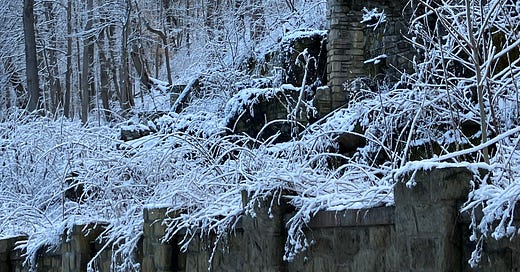Last week, I was driving up from town to my house and made the usual turn at a T-junction crossroads. Straight ahead at the junction sits a “castle”: a large house made of stone, complete with the ruins of a grotto and castellated gazebo.
The castle has been empty for years, but neighbors have told me that it’s become in recent years the off-and-on weekend project for a couple of New Jersey chiropractors. I’ve lived at my current house for two years, and had as last week not met my chiropractor neighbors. I had tried to contact them before, to no avail.
However, as I turned at the junction last week, I saw a middle-aged couple doing landscaping work in the grotto. I stopped to introduce myself, and discovered that they were the fabled chiropractors. We spoke for a short while before they declared to me how much they loved West Virginia: notably the scenery and people. They especially loved how kind everyone is. I told them this surprised me, because our society has decayed a bit from the one my father grew up in and the one I caught glimpses of in my childhood. I didn’t tell my neighbors this, but when I see the modern cities of West Virginia, I have an overwhelmingly “chuddish” attitude.
A few days ago, the English YouTube personality (and subject of this recent article in UnHerd) Carl Benjamin released a video titled “Reflections on America” where he talks about his recent trip to America and how it showed him just how much societal trust has been lost in Britain in his lifetime.
“the distance between their civilization and our civilization is growing and this is I think not to our benefit”
“the Americans are far happier than we are… they seem bubbly and optimistic”
He says this was most apparent in his trips to West Virginia.
I really like West Virginia. … West Virginia is the place in America that most reminds me of Wiltshire—where I live in the southwest of England—and in fact it’s peopled by mostly English settlers, back in the day as I understand it, and so it’s got that kind of English vibe to it, a kind of Old English vibe which is really nice. The people are very, very, very polite, and they’re very very nice, and they’re very… just… just… normal. I mean, I would call them homely but in America, that’s actually an insult. In England that’s a compliment. They’re… they’re… they’re just normal, right? And they’ve got a nice rural area and there’s no trouble. Everything is just you know smoothly ticking over, the sort of bucolic life of the countryside and it was just really lovely and so the place is like a well-tended garden, right? And it’s just very relaxed. All the people have been very relaxed, and I’ve been there a few times now and it’s always just been a really pleasant experience. Everyone has just been really, really nice… this is what England used to be like before things changed and people started becoming more withdrawn. And I noticed on the way over I was rude to people without meaning to be rude to them.
Watching Benjamin’s video shortly after meeting my New Jersey asylum-seeker neighbors—at the same time as the MAGA’s and neoreaction’s chattering classes are buzzing about low-trust vs. high-trust societies—was striking. I like to tell people that I grew up in a poor but privileged household, partially because I think it sounds smart, but I do sincerely believe it. The society I grew up in thanks to my parents and forebears was a precious inheritance. I knew a stability and received a worldview that relatively few others in history have. To see the living generations squander this inheritance causes me continual unease, but these recent experiences remind me that I can’t write anything off as completely lost, especially when I have a duty to fix what I can.
Carl Benjamin is correct when he says that you don’t have to be explicitly rude in order to make society seem less pleasant, but the truth goes even deeper: high-trust society is the labor-intensive process of carving moral order from cruel Nature, and it requires nothing but neglect in order for social entropy to set in. You—yes, you—have a duty to care for your community’s health like a garden. I don't mean “community” the way politicians do, either: cynically synonymous with “demographic”; I mean the people you live with, your extended neighbors.
If this sounds “fake and gay” to you, that’s because it kind of is. Getting along with people always requires some level of meek cooperation. The pirate society of masculine equals à la Bronze Age Pervert is only natural for young men. You should not be brutally honest in a presumptuously familiar way with the old lady who lives down the street from you. You should wave when you drive by, and offer to clear her yard when a storm fills it with debris. It’s easy but never-ceasing. This is the work that builds generational stability and nurtures the young and old. It’s the work cut out for us.





